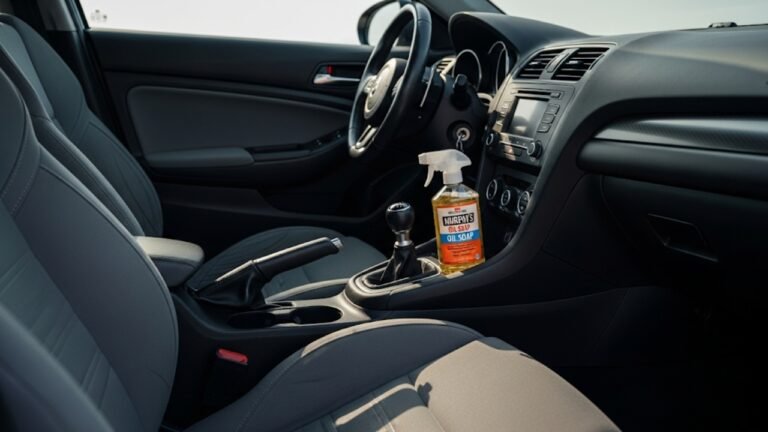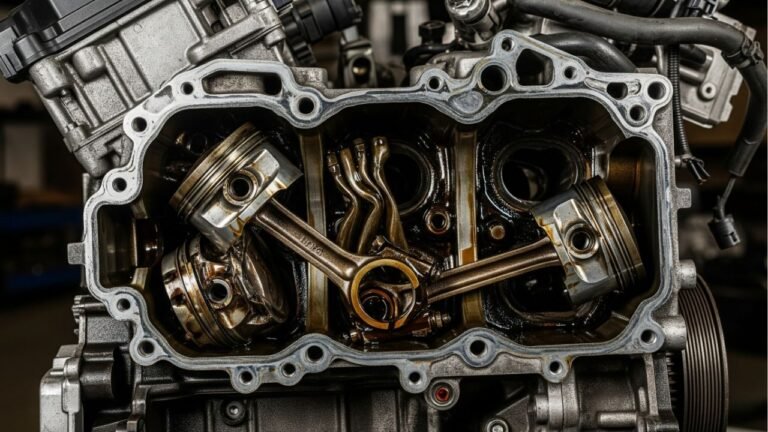Why Do You Change the Oil in Your Car

Changing the oil in your car might seem like a small task. But trust me—it’s one of the most important things you can do to keep your vehicle healthy. It’s like feeding your body the right food. If you don’t eat well, you feel sluggish. If your car doesn’t get fresh oil, it starts to wear down. Slowly but surely.
When I bought my first car—a hand-me-down 2006 Corolla—it ran fine at first. But I ignored oil changes. It wasn’t long before the engine started knocking. That’s when I realized how much damage skipping oil changes can do. If you’ve ever wondered why do you change the Oil in Your Car times or more over its life, this article will clear it all up. Let’s dive into the real reasons, the science, and a few stories along the way.
Your Engine’s Lifeblood: Why Oil Matters So Much

Oil does three essential things:
- Reduces friction so parts don’t grind each other down.
- Carries away heat to stop the engine from overheating.
- Traps dirt and metal bits that would otherwise damage parts.
Over time, oil gets dirty. It loses its power to lubricate and cool. That’s when it becomes a problem. If you’re asking, why do you change the Oil in Your Car times across its life? It’s because dirty oil becomes a silent killer. You won’t notice it right away, but the damage adds up.
The Hidden Dangers of Skipping Oil Changes
I get it. Life gets busy. Maybe you’re short on cash. Or maybe you just forget. But skipping oil changes is like skipping doctor visits for years. One day, something serious will break.
Let me share something personal. A friend of mine, Rajiv, drove his car for 30,000 miles without a single oil change. It was running, but barely. One day, it just stopped on the highway. The engine seized. When the mechanic opened it, the oil looked like tar. Thick, black, and useless.
Here’s what dirty oil does to your car:
- Sludge buildup clogs engine parts.
- Increased wear on pistons and bearings.
- Overheating because oil can’t carry heat properly.
- Higher fuel consumption due to poor lubrication.
- Complete engine failure, costing thousands in repairs.
All of this because the oil wasn’t changed. So, when we ask again, why do you change the Oil in Your Car or more times? It’s because every oil change is like a breath of fresh air for your engine.
How Often Should You Really Change It?
There’s a lot of confusion about oil change frequency. Some say every 3,000 miles. Others push it to 10,000. What’s right? Honestly, it depends on your car type, oil type, and driving habits.
Let’s simplify:
| Type of Oil | Average Change Interval |
| Conventional Oil | Every 3,000 to 5,000 miles |
| Synthetic Blend | Every 5,000 to 7,500 miles |
| Full Synthetic | Every 7,500 to 10,000 miles |
If you mostly drive in city traffic, your oil wears out faster. Short trips don’t let the oil warm up enough. If you drive on highways regularly, your oil lasts longer.
A good rule? Check your manual. It knows your car better than anyone. And if your dashboard oil light comes on? Don’t ignore it. It’s your car’s way of crying for help.
Oil Filters: The Unsung Heroes of Clean Engines
Every time you change your oil, you should also change the oil filter. Why? Because that filter collects all the gunk your oil picks up—metal shavings, carbon deposits, and dirt. Over time, the filter gets clogged.
Here’s a relatable analogy. Imagine vacuuming your house without ever emptying the dust bag. Eventually, it stops picking up dirt. Same goes for oil filters. If you don’t replace them, the old oil just circulates the same junk over and over.
If you’re asking, why do you change the Oil in Your Car times or more? Each oil change includes a new filter. And each filter swap keeps your engine free from harmful debris.
Let’s break it down:
- Old oil filters can restrict flow and cause pressure drops.
- Clogged filters reduce efficiency of the oil pump.
- Long-term, this can lead to engine overheating and power loss.
So don’t skip the filter. It’s just as vital as the oil itself.
The Economic Side: Oil Changes Save You Money
I know—changing oil can feel like a chore. And sure, spending $40–$100 every few months adds up. But the cost of not changing oil is far worse.
Let’s do some basic math.
- Average cost of a regular oil change: $50
- 9 oil changes over 100,000 miles: $450
- Cost of engine replacement: $4,000 to $8,000
See the difference?
By spending a few hundred bucks over the years, you’re protecting your engine from catastrophic failure. It’s like changing the batteries in your smoke alarm. You hope you never need it, but it’s priceless when disaster strikes.
And here’s something even more real—well-maintained cars have better resale value. When I sold my Corolla (after learning my lesson), the buyer was thrilled to see all my oil change records. That helped me get a better price and close the deal fast.
Engine Performance and Feel: Fresh Oil Makes a Difference
If you’ve ever driven your car right after an oil change, you know what I mean. It feels smoother. The engine runs quieter. Acceleration improves. That’s not just your imagination.
Clean oil reduces friction, which helps all the moving parts glide easily. There’s less resistance in the engine. That means your car doesn’t have to work as hard.
Here’s how it feels:
- Less engine noise and rattling.
- Smoother gear shifts (especially in automatics).
- Better throttle response when accelerating.
- Slight increase in fuel efficiency.
Why does this matter? Because driving should be enjoyable, not stressful. I remember taking my car on a road trip after an oil change. It was smooth sailing all the way. The peace of mind was worth every penny.
If you’re wondering again, why do you change the Oil in Your Car times or more? It’s because every oil change brings your car back to life—just like a fresh breath of mountain air.
Long-Term Engine Health: Prevention Beats Repair
Let’s look at the bigger picture. Changing your car’s oil isn’t just about today. It’s about preserving your engine for years. Cars today can last 200,000 miles or more. But only if you take care of them. And the number one step? Keeping your oil fresh.
Think of your engine like a marathon runner. If they don’t stay hydrated, they’ll burn out. Oil is your engine’s hydration. Without it, heat and metal friction wear everything down fast.
Here’s what clean oil does over time:
- Protects the engine block from corrosion.
- Keeps moving parts from wearing out early.
- Reduces the risk of carbon deposits.
- Extends timing chain and valve life.
Skipping just a few oil changes might not cause problems immediately. But the damage builds up slowly. Years later, your engine might suffer a breakdown that could’ve been avoided. That’s why people often ask, why do you change the Oil in Your Car or even 20 times? Because it keeps your engine running strong through every season and milestone.
The Environmental Angle: Used Oil Is Dangerous
There’s another reason we should all care about oil changes—and it goes beyond cars. It’s the environmental impact. Used engine oil is toxic. When it’s old and dirty, it contains heavy metals and chemicals. If it leaks or gets dumped improperly, it can pollute water, soil, and air.
A single gallon of used motor oil can contaminate one million gallons of water. That’s not just a statistic—it’s a wake-up call.
What can you do?
- Always take used oil to a certified recycling center.
- Never pour it down the drain or toss it in the trash.
- Use eco-friendly, synthetic oils that last longer and reduce waste.
Being a responsible car owner also means being a responsible citizen. If you’re doing 9 oil changes across your car’s life, that’s 9 chances to do it the right way. So again, if someone asks, why do you change the Oil in Your Car times? You can say—it’s for the engine, but also for the planet.
Seasons and Weather: Why Timing Matters
Most people don’t realize this, but oil behaves differently in different weather. In cold climates, oil gets thicker. In hot climates, it can thin out. That’s why seasonal oil changes are more than just a habit—they’re essential.
Let’s say you live somewhere with snowy winters. You’ll need oil that can flow well at low temperatures. Otherwise, your engine will struggle to start. In hot areas, oil breaks down faster due to heat, so you might need to change it more often.
Here’s a tip from experience:
- Use winter-grade oil (like 0W-20) before the cold hits.
- Switch to higher viscosity oil (like 10W-30) in summer if you tow or drive long distances.
Each season brings its own challenge. But if you plan your oil changes with the seasons, you’re giving your car the best chance to thrive all year. Another smart reason why you change the Oil in Your Car times or more over its life.
Myths and Mistakes: Clearing Up the Confusion
Let’s tackle a few myths that still confuse many drivers:
- Myth 1: You can wait until the engine light comes on.
Reality: By then, it might be too late. Oil changes should be proactive, not reactive. - Myth 2: Synthetic oil means you never have to change it.
Reality: Synthetic oil lasts longer, yes—but it still wears out. Always follow manufacturer guidelines. - Myth 3: You only need to change oil if you drive a lot.
Reality: Oil breaks down over time—even if the car sits still. Time-based changes are just as important.
These myths can cause real damage. I’ve known people who drove less and thought they were safe. But old oil oxidizes, forming acids that eat away at your engine.
So when someone asks you why do you change the Oil in Your Car times even if you don’t drive much, you’ll have the facts to back it up.
The Emotional Bond: Taking Pride in Your Car
We don’t just drive cars. We build memories in them. Your car takes you to work, to family, to freedom. Taking care of it becomes a small act of love. Just like feeding your pet or watering your plants.
There’s something special about popping the hood and doing the oil change yourself. It connects you to your vehicle. Makes you feel responsible, even empowered.
When I changed the oil in my first car, I spilled some on my driveway. It was messy. But I felt proud. I was learning to care for something I relied on every day.
Regular oil changes say something about you:
- You’re dependable.
- You value your investments.
- You’re not afraid to get your hands a little dirty.
So again, why do you change the Oil in Your Car times? Because your car deserves it. And so do you.
Wrapping It Up: It’s More Than Just Oil
By now, you’ve seen how oil changes aren’t just routine maintenance—they’re vital. They touch every part of your car’s life, from performance to economy, from safety to environmental responsibility.
Let’s recap the main points:
- Oil lubricates your engine, reducing wear.
- It cools hot parts and prevents damage.
- Fresh oil improves fuel economy and performance.
- Dirty oil leads to engine failure and big repair bills.
- Regular oil changes extend your engine’s life and value.
- Responsible disposal protects the environment.
- It’s part of being a proud, informed car owner.
And yes, why do you change the Oil in Your Car times or more? Because your car has a journey ahead. And every change is like helping it take the next step safely and smoothly.
Take it from someone who learned the hard way—it’s a small habit that makes a big difference. So go ahead. Mark that oil change on your calendar. Your engine will thank you, mile after mile.






